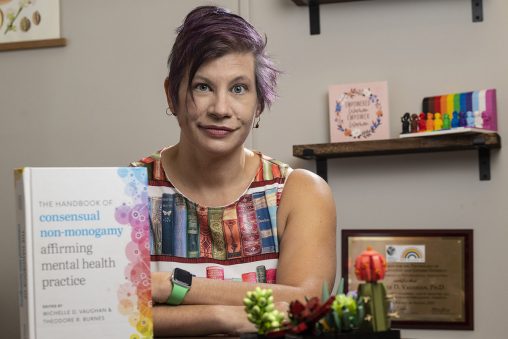
Michelle Vaughan, associate professor in the School of Professional Psychology, is co-editor of a new handbook providing research-based training for mental health practitioners who work with the consensual non-monogamy community.
Michelle Vaughan, Ph.D., an associate professor in the Wright State University School of Professional Psychology, has published “The Handbook of Consensual Non-Monogamy Affirming Mental Health Practice.”
The handbook was developed for mental health providers, including social workers, counselors, psychologists and psychiatrists, who want to become consensual non-monogamy-affirming practitioners.
Vaughan said that the handbook is the first of its kind in that it provides research-based training on how to work with the consensual non-monogamy (CNM) community.
“We were thrilled to have several well-known authors and researchers in CNM contribute to this volume, including Dr. Amy Moors and Dr. Eli Sheff. The handbook garnered the #1 spot for new releases in psychotherapy on Amazon this summer when it was released and the SOPP is currently developing a series of continuing education training courses for mental health providers based on the book,” said Vaughan.
The handbook provides a unique resource that is rooted in cultural humility, current research on consensual non-monogamy and the unique and diverse identities of the consensual non-monogamy community, including intersections with disability, queerness, race and class.
“We have specific chapters from experts across disciplines on training and supervision, organizations, stigma, families and children, queerness and ethics designed to meet clinicians wherever they are on their journey to be CNM-affirming,” Vaughan said.
Vaughan said that relationship stigma is a major source of stress for those who practice consensual non-monogamy, primarily because of social messages and norms that people should and need to be monogamous, or mononormativity. Because of this stigma, laws, faith communities and health care providers typically are based in this norm, she said.
“This excludes and harms folks who practice different relationship styles and leads to a huge gap in accurate knowledge and skills for folks in healthcare and other service professions,” Vaughan said
Within consensual non-monogamy relationships, Vaughan said that most of the stresses and challenges come from navigating internalized messages about monogamy, learning and practicing effective communication, especially around boundaries, needs and wants, navigating scheduling issues and managing complex and new emotions. She said that mental health providers are unlikely to have ever received accurate, research-based training on how to work with this population.
“This handbook was created to provide a resource to folks who may not have access to training or consultation in this area and want an up-to-date, broad guide to clinical practice that integrates the voices of experts across disciplines with diverse perspectives,” she said. “Given the rapid expansion of CNM literature in the social sciences, we were able to provide a resource that has greater breadth, depth, and integration of research than currently exists in similar books.”
Vaughan has been with Wright State for the past seven years, training doctoral students in clinical psychology and teaching courses in humility and cultural diversity, clinical interviewing, and sex, gender and relationship diversity. She also provided clinical supervision for students and has published scholarly work on LGBTQ+ and consensual non-monogamy topics relevant to health care practice.

 Walking through open doors
Walking through open doors  Adventures await
Adventures await  Wright State to expand nursing facilities to meet workforce needs and prepare more graduates for in-demand careers
Wright State to expand nursing facilities to meet workforce needs and prepare more graduates for in-demand careers  Wright State student-athletes make a lasting impact on local family with more to come
Wright State student-athletes make a lasting impact on local family with more to come  Wright State names Rajneesh Suri dean of Raj Soin College of Business
Wright State names Rajneesh Suri dean of Raj Soin College of Business 